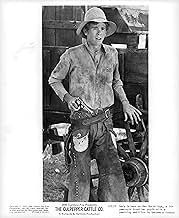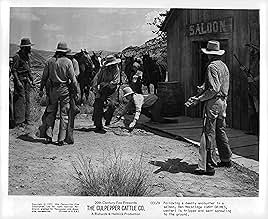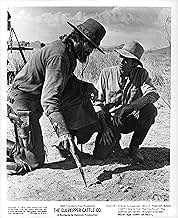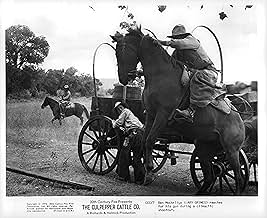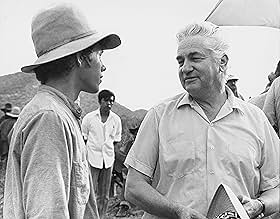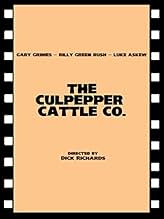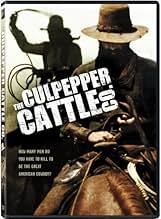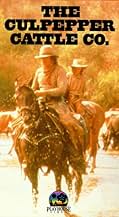AVALIAÇÃO DA IMDb
6,9/10
2 mil
SUA AVALIAÇÃO
Adicionar um enredo no seu idiomaYoung farmboy who always wanted to be a cowhand talks a tough trail boss into hiring him on a cattle drive.Young farmboy who always wanted to be a cowhand talks a tough trail boss into hiring him on a cattle drive.Young farmboy who always wanted to be a cowhand talks a tough trail boss into hiring him on a cattle drive.
- Direção
- Roteiristas
- Artistas
- Prêmios
- 2 indicações no total
Billy Green Bush
- Frank Culpepper
- (as Billy 'Green' Bush)
Charles Martin Smith
- Tim Slater
- (as Charlie Martin Smith)
- Direção
- Roteiristas
- Elenco e equipe completos
- Produção, bilheteria e muito mais no IMDbPro
Avaliações em destaque
I've only seen "Culpepper Cattle Company" once. That was in a cheap theater in Tokyo in 1973 that showed three different films for the one admission price of 350 yen, which at that time was the dollar equivalent of about $1.50. For the past 30 years I have been waiting for it to come around again, come out on video, or appear on television. One of the co-features in the theater that day was "Bad Company" with Jeff Bridges and John Savage. That is another underrated film which has never returned. What fascinated me about "Culpepper Cattle Company" was its escalation in gritty cussedness. We start out with two wild boys recklessly racing wagons. One of them joins these seemingly foul mouthed, onery lot of cowboys. On the trail a couple of even morally worse characters steal the boys horse. But the cowboys are more intimidating than they are, so they give the horse back. Then, the cowboys encounter a farmer with his hands as back up who are even more threatening than the cowboys, especially since the farmers have the drop on them. These foul mouthed, gritty, onery cowboys are, by comparison, looking better all the time. They even give up their lives so that some pilgrims can settle down in peace. And finally, we see who is absolutely the WORST in depravity. It's the pilgrims who, to add insult to injury, won't lift a hand to bury the cowboys who have given their lives for them since they have this sanctimonious thing against having anything to do with people who engage in violence.
"The Culpepper Cattle Company" really looks and feels authentic, as if you are actually witnessing a cattle drive in the year 1866 being led by trail boss and cattle owner Frank Culpepper (Billy Green Bush). That's because, for one thing, a lot of dust gets kicked up and nobody is clean. And the cowboys talk as though they are real cowboys. They complain about the dust, and the food, and the work, and the low wages, and just about everything else. At night, they tell tall stories around the campfire, mostly about the women they've been with. Pete (Matt Clark), the best storyteller, spins a yarn about all the naked Parisian women you could see on the second floor through the glass ceiling. Hilarious.
Two other interesting characters in the drive include the trigger-happy, touchy Russ (Geoffrey Lewis) and Dixie Brick (Bo Hopkins), who gets his kicks from seeing guys get shot. Those two engage in this crazy hysterical laugh before the final shootout.
All of this is seen through the eyes of young Ben (Gary Grimes) who hires on as a little Mary (cook's helper). He wants nothing more than to be a cowboy but soon finds out things are not quite as he imagined. When he tells the cook how much he wants to be a cowboy, he gets told that cowboying is something you do when you can't do anything else. After he asks Luke (Luke Askew) what his horse's name is, he gets told that you don't have to name something you might have to eat.
Expect a lot of violence. This was made in 1972, a couple of years after "The Wild Bunch" had set the standard for the wholesale slaughter of men.
Two other interesting characters in the drive include the trigger-happy, touchy Russ (Geoffrey Lewis) and Dixie Brick (Bo Hopkins), who gets his kicks from seeing guys get shot. Those two engage in this crazy hysterical laugh before the final shootout.
All of this is seen through the eyes of young Ben (Gary Grimes) who hires on as a little Mary (cook's helper). He wants nothing more than to be a cowboy but soon finds out things are not quite as he imagined. When he tells the cook how much he wants to be a cowboy, he gets told that cowboying is something you do when you can't do anything else. After he asks Luke (Luke Askew) what his horse's name is, he gets told that you don't have to name something you might have to eat.
Expect a lot of violence. This was made in 1972, a couple of years after "The Wild Bunch" had set the standard for the wholesale slaughter of men.
10TonyMan
I feel this is possibly the best Western I have ever seen. It portrays gritty people with simple outlooks to life. I believe this must truly show what the west was like - simple, rough, dirty, bad fitting clothes, etc. I was raised on Disney movies and when you compare this to them you get a real feel for what happens when a kid decides to chase a dream in the world of adults. My favorite line is when the kid tells one of the cowboys that being a cowboy is the greatest job in the world. The guy responds, " Kid, being a cowboy is what you do when you can't do anything else".
I suggest this as required viewing for anyone with an interest in the Old West.
I suggest this as required viewing for anyone with an interest in the Old West.
Although a small movie, "The Culpepper Cattle Company" is arguably one of the top ten westerns of all time. It takes a fairly basic but relevant coming of age story and sets it in the American West. But the "been there-done that" stuff gives way to something that has extremely heavy Peckinpah influences. Like "The Wild Bunch" (and Bo Hopkins gets to reprise his Clarence "Crazy" Lee role) this becomes a violent anti-violence film with blurred lines between "good guy" and "bad guy". As with Peckinpah's "Straw Dogs", moral ambiguity is the theme and it is not until near the end that the four drovers, pressed to finally take a moral stand, redeem themselves with a final act of personal responsibility.
In addition to a good characterization from Hopkins, Geoffry Lewis plays the wrapped a little too tight "Russ" with an over-the-top Gary Oldman-like flare, and Luke Askew does a masterful job as the drover who provides early clues that these are four guys who have had to subordinate their basic goodness in order to survive in this environment. Billy Green Bush plays "Frank Culpepper" who remains focused on business to the exclusion of any lost causes. Bush played the likable "Elton" in "Five Easy Pieces" who was responsible for the classic Nicholson line: "don't tell me about the good life Elton, the good life makes me want to puke".
Also exceptional is the cinematography and the production design. Back in the ancient 1970's, only the high budget pictures had production designers. The others had to rely on the cinematographer to make sure the art director, the set designer, and the make-up/costume people were all on the same page; so that the picture had a consistent look. Ralph Woolsey was one of the better cinematographers at keeping all these elements under control.
It became popular after Robert Altman's "McCabe and Mrs. Miller" (1971) to replace the well-scrubbed Roy Rogers look and portray the west as dirty, dusty, gritty, unshaven, and tattered. Woolsey eagerly embraced this realism in 1972 and gave us two of the grimiest features we are likely to see; the excellent "Culpepper Cattle Company" and the somewhat lame "Dirty Little Billy".
The shootout scene in the saloon (midway into the film) is more climatic than the final scene. Not until "The Unforgiven" has there been so much action-so fast-on such a tiny set; yet Woolsey captured it all and the post-production people assembled it into a neat and logically sequenced package. So you can follow the whole thing with very little confusion.
In addition to a good characterization from Hopkins, Geoffry Lewis plays the wrapped a little too tight "Russ" with an over-the-top Gary Oldman-like flare, and Luke Askew does a masterful job as the drover who provides early clues that these are four guys who have had to subordinate their basic goodness in order to survive in this environment. Billy Green Bush plays "Frank Culpepper" who remains focused on business to the exclusion of any lost causes. Bush played the likable "Elton" in "Five Easy Pieces" who was responsible for the classic Nicholson line: "don't tell me about the good life Elton, the good life makes me want to puke".
Also exceptional is the cinematography and the production design. Back in the ancient 1970's, only the high budget pictures had production designers. The others had to rely on the cinematographer to make sure the art director, the set designer, and the make-up/costume people were all on the same page; so that the picture had a consistent look. Ralph Woolsey was one of the better cinematographers at keeping all these elements under control.
It became popular after Robert Altman's "McCabe and Mrs. Miller" (1971) to replace the well-scrubbed Roy Rogers look and portray the west as dirty, dusty, gritty, unshaven, and tattered. Woolsey eagerly embraced this realism in 1972 and gave us two of the grimiest features we are likely to see; the excellent "Culpepper Cattle Company" and the somewhat lame "Dirty Little Billy".
The shootout scene in the saloon (midway into the film) is more climatic than the final scene. Not until "The Unforgiven" has there been so much action-so fast-on such a tiny set; yet Woolsey captured it all and the post-production people assembled it into a neat and logically sequenced package. So you can follow the whole thing with very little confusion.
Others have summarized this film quite well. I would only add that it's unique in being the only good film I can readily remember that consists of nothing but supporting players. Not a star among 'em. Billy Bush Green, Geoffrey Lewis, Luke Askew, Bo Hopkins and many others are indelibly played, e.g., the stuttering barkeep who keeps a "genuine former virgin" in the back room; the Mexican cantina owner who keeps a rattlesnake in a jar and wins money from customers by betting they can't hold their hand against the glass when the snake strikes; the preacher who declares of the land his followers stop at as the "place God has chosen for us" until the shooting starts and he decides to move because "God was only testing us."
Gene Autry and Smiley Burnette it ain't. Catch it if you can.
Gene Autry and Smiley Burnette it ain't. Catch it if you can.
Você sabia?
- CuriosidadesThe pistol Ben (Gary Grimes) shows off to Tim (Charles Martin Smith) at the beginning of the movie and later kills his first man with during the saloon shootout, is a model 1858 Remington Army.
- Erros de gravaçãoImmediately after starting the drive, the cook needs to spit, and does so across Ben, who is sitting beside him. The cook then tells Ben that he better "Sit down wind." This is wrong, because Ben should sit Up Wind. You never spit Into-The-Wind, you always spit With-The-Wind or Down Wind. The line should have been, "You better NOT sit down wind."
- Citações
Cook, Culpepper Outfit: You really got the itch, ain't ya?
Ben Mockridge: Well, yeah, I do. I guess all I want to do is punch cows and ride and, well, just cowboying. There's nothing better than that. That's all I want.
Cook, Culpepper Outfit: Kid, cowboying is something you do when you can't do nothing else.
Principais escolhas
Faça login para avaliar e ver a lista de recomendações personalizadas
- How long is The Culpepper Cattle Co.?Fornecido pela Alexa
Detalhes
- Tempo de duração
- 1 h 32 min(92 min)
- Cor
- Proporção
- 1.85 : 1
Contribua para esta página
Sugerir uma alteração ou adicionar conteúdo ausente


